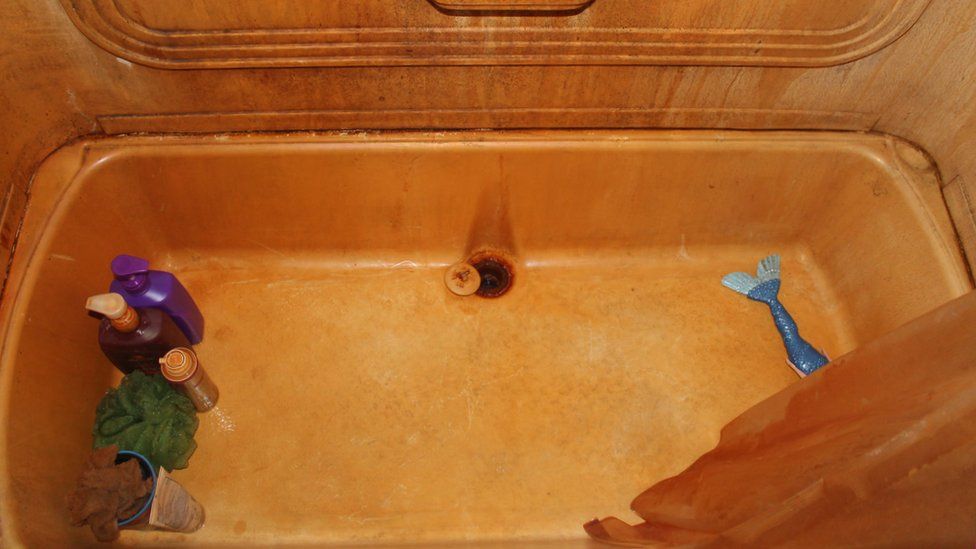Not exactly the same as a shopping center.
A toxic crisis in America’s coal country
A toxic crisis in America’s coal country
By Gareth Evans
BBC News, Wyoming County, West Virginia
Published
11 February 2019
Image caption, A bathroom of a home stained by polluted water near a coal mine in West Virginia
In the shadow of some of America's most controversial coal mines, where companies use huge amounts of explosives to blow the tops off mountains, isolated communities say their water has been poisoned.
Now, they must decide if they will fight back against an industry they have relied upon for generations.
Casey wears a one-dollar wedding ring now. She bought the blue plastic band after her original ring was ruined by the toxic water that has been pumping into her home for more than a decade.
"I just needed something there," she says, as she holds the replacement ring up to the light. "I felt empty without it." She places her original wedding band, now discoloured and corroded, in her palm. Her skin, especially on her hands, has become coarse and sore.
The taps in her house have been worn down, her washing machine frequently stops working, and her bathroom and kitchen have been stained a deep, bloody orange by the pollutants - iron, sulphur, even arsenic - that have seeped into her home's water supply.
This is Appalachia - the heart of America's coal country. It is home to some of the poorest and most isolated communities in the US and the legacy of mining, be it the abandoned processing plants or the scarred landscape, can be seen dotted alongside its vast highways.
....................
At the sprawling mine in the neighbouring valley, millions of pounds of explosives are being detonated on the mountaintops so that coal, buried deep below the surface, can be excavated.
This process is a type of surface mining known as mountaintop removal, and has drawn the ire not only of nearby residents but of environmental groups who say it devastates the landscape and pollutes the waterways.
One study estimates that an area the size of the state of Delaware has been flattened by this type of coal mining since it was first practised in the 1970s.
Another report by the Environmental Protection Agency (EPA) estimates that more than 2,000 miles of streams - a distance longer than the Mississippi river - have been buried by the excess rock and soil (known as overburden) that is dumped after the explosions.
.........................................................
"When you dump a lot of overburden into the valley, and start covering up streams, you have water sources that end up travelling through the [waste] material,' says Professor Michael McCawley, an environmental engineer who has spent time researching the health impacts of mountaintop removal.
"It's kind of like dumping geological trash," he explains. "It ends up increasing the concentration of acidic ions and metals [in the water], things like arsenic and nickel."
This pollution, according to his research, has taken a catastrophic toll on the health of those whose water supply lies in its path.


